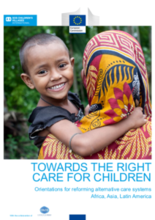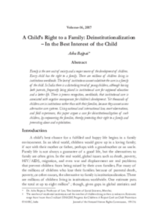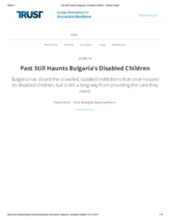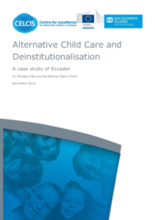Displaying 291 - 300 of 668
This short animation tells the story of a young boy and girl forced to flee their homes, and how detention can be avoided in order to complete their migration status.
This synthesis report contains findings of a study that conducted research in six South and Central American, Asian and African countries for the purpose of gaining understanding of the nature, extent, and scope of institutionalization and the feasibility of deinstitutionlisation.
The general objective of this study was to conduct a research on the possible issue of institutionalisation in six South and Central American, Asian and African countries in order to strengthen the knowledge of the European Commission on the nature, the extent and scope of institutionalisation and feasibility of de-institutionalisation (alternative care for children).
Using national and international law, court observations, and field experiences, this paper argues a case for deinstitutionalization of children in India, by empowering the families, thereby protecting children's right to a family and preventing abuse and exploitation.
This abstract relays the findings of a survey on informal carers' views and opinions under the current conditions of social support in the Czech Republic.
This article discusses Bulgaria's challenges since the shut down of its crowded institutions, which housed disabled children.
The overall purpose of this study is to present an ‘introduction’ to alternative care systems in Central and South America (CSA).
The European Commission Directorate-General for Justice and Consumers commissioned SOS Children’s Villages International to undertake case studies of arrangements for ‘alternative child care’ in six non-European countries in three continents to help inform the EU’s future strategy for provision of support for children in countries outside Europe. This report is a case study of one of the six countries, Chile.
The report investigates why children are placed into alternative care, what types of alternative care are available in Nepal, what structures and processes govern alternative care, how the alternative care workforce are trained and supported, and what is and is not working in Nepal's current system. It concludes with recommendations for enhancing alternative care in the country.
The European Commission Directorate-General for International Cooperation and Development (DG DEVCO) commissioned SOS Children’s Villages International to undertake case studies of arrangements for ‘alternative child care’ in six non-European countries across three continents to help inform the EU’s future strategy for provision of support for children in countries outside Europe. This report is a case study of one of the six countries, Ecuador.








